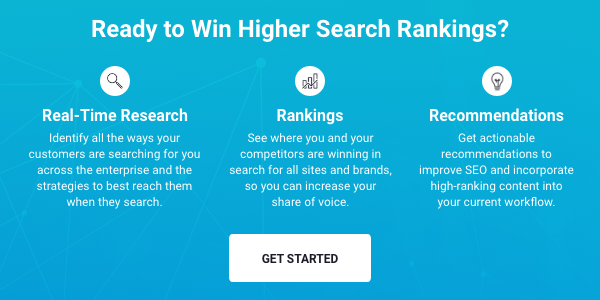Search engine optimization (SEO) is a channel embraced by organizations of all sizes, and according to recent surveys, it’s one of the channels most prioritized by CMOs for 2023. Companies rely on various technologies to help them achieve positive traction in organic search results. These technologies help them understand where their website ranks for keywords they care about, what fixes need to be addressed to ensure search engines see all the content on their site, and how competitors stack up to them, among many other things.
To execute SEO, there are hundreds of providers that offer tools that either do specific tasks or pull data sets from multiple 3rd party sources together. Additionally, there are SEO platforms that consolidate these functions into a single stack. Whether a company should do SEO with multiple single-purpose tools or leverage a comprehensive platform depends on several factors. While budget is often a primary consideration, it’s important to remember that a platform can save you time and money.
Before we go further, let’s define a point solution and an enterprise platform.
Point solutions are tools that perform a specific function. That may be crawling a website and producing data points on the performance of the crawl. Another point solution may collect keyword rankings for your website, while another may measure the conversions and on-site performance. It then falls to the organization to aggregate and analyze this data so they can then execute against it.
Enterprise platforms bring several functions together under one solution and interface. Many times, enterprise platforms allow for the creation of workflows and connect data through integrations. This allows users to create new ways to customize the data and generate new insights that would be difficult to gain without integration.
Do any of the following scenarios sound familiar to you? If so, it may be time to invest in an enterprise SEO platform.
1. You have limited resources or need to scale your SEO work quicky
Do any of these scenarios sound familiar to you?
- You’ve just been made the main SEO person for your company and now everyone is coming to you for help
- You have a small team and you’re trying to balance SEO with many other projects.
- You’re being asked to do more SEO work without more resources to help you.
These are common cases where enterprise SEO platforms are transformative for you and your organization. They deploy automation on repetitive SEO tasks so you can be freed up for higher value work. They also consolidate multiple tools into one solution, simplifying how you track and manage your SEO. A typical SEO without a platform will leverage four to six tools and spend up to two hours per day analyzing this data. This can create significant bandwidth barriers to effectively executing SEO. If you need that time back and need to quickly activate, then an enterprise SEO platform could be beneficial for you. Within the BrightEdge platform, users can leverage Content IQ, Keyword Reporting and Autopilot to automate many day-to-day activities such as site crawls, ranking reports, and on-page optimizations. This allows teams to focus on more strategic work and reduces time spent proving their strategies are sound.
2. You need to report on organic performance to different teams
Are these scenarios familiar to you?
- You’re trying to show multiple teams or departments how your SEO campaigns are performing, but it’s difficult to pull and distribute the information
- Your stakeholders have different ideas of what SEO success looks like. Some people in your organization are heavily involved in SEO, while others only need a high-level overview.
90% of surveyed companies expect SEO to have greater emphasis in 2023. This will inevitably lead to more stakeholders in the organization taking interest in the impact of SEO work. This easier it is to communicate how the campaign is performing and how it benefits them, the more buy-in and advocacy the SEO programs receive. Enterprise SEO platforms are designed to make it easy to communicate across an organization. With a platform like BrightEdge, users have dashboards designed for executive, technical, and content teams, and can automate communication about specific or immediate needs. Another differentiation between a point solution and an enterprise platform is that platforms support multiple users with different permissions. With BrightEdge, organizations can assign administrators, standard users, and different degrees of read-only access for contractors and stakeholders throughout the organization.
3. You need to collaborate across teams to execute initiatives
Do you recognize these situations?
- To execute your SEO strategy effectively, you need different teams such as content, technical, and management to work together.
- Different teams within your organization have different tools or methods of organizing and prioritizing their work.
- You need to bring all your SEO projects together and see how they are contributing to your business outcomes overall
If a SEO team is using several point tools, it can be difficult to share data across teams. They may not have access to all the tools, or they may need to do their own mashups of data to arrive at the insights they need. This requires more time, and in many cases, it simply doesn’t get done. In this scenario, an enterprise SEO platform can save you considerable time and effort. Enterprise SEO platforms support multiple logins and views of data. They also have collaboration tools that are difficult to replicate without a platform underpinning everything. For example, BrightEdge’s Task Manager allows SEO teams to assign tasks to different groups, push them to their project tool of choice (Monday.com, Wrike, Jira etc.) and track the task against organic performance.
4. You need to measure performance as market conditions shift, while adhering to the latest compliance requirements
Do any of these challenges sound familiar?
- You are being asked to achieve more with less budget, maybe because PPC spend is decreasing and organic search needs to compensate
- You work in a highly regulated industry or a region where data privacy laws are strict
- You have multiple websites or work across different regions, and need to compare performance over time
Enterprise SEO platforms, like BrightEdge, offer built-in analytics and reporting tools that make it easy to measure the impact of your SEO efforts against other channels and relative to market conditions. For example, if you are decreasing PPC budgets, it’s crucial to measure whether and how much the organic channel is compensating. A platform will provide valuable insights into how your website is performing, where you need to improve, and what strategies are working. Additionally, enterprise SEO platforms can also help ensure compliance with regulations such as GDPR and CCPA by providing features such as data management, consent management, and data subject rights management. By leveraging these features, you can better measure your SEO performance and make data-backed decisions to drive more traffic and conversions through the organic channel.
5. You need more flexibility in how you slice and dice your data
Have you found yourself in one of these situations?
- You are tracking different types of conversions such as sales and video views or signups for your SEO effortt
- Your organization has specific quotas, personas or journeys that you need to tailor your metrics to
- Your analytics team needs a simple way to push metrics into a data visualization tool
Point solution tools are designed to address specific, singular issues. While they may integrate with some analytics offerings, they are limited in the different connections. Enterprise platforms, on the other hand, allow for greater customization options, and flexibility in how data is ingested from other marketing tools. For example, with BrightEdge, dashboards are fully configurable to pull modules from anywhere in the platform and integrate web analytics and search console data. They can also create filtered views throughout the platform to create views of data or segments of search that are relevant to specific groups in the organization. These visuals can then be sent to a data visualization resource like Tableau or Google Data Studio for further customization without stitching together incremental data sources. BrightEdge customers can also use the platform as a repository for historical data. For example, with the upcoming migration to GA4, BrightEdge not only seamlessly connects your UA Google Analytics to your new GA4 data, but it also archives your historical GA data (Google will not support historical UA accounts after December 31, 2023).
If any of these five signs and corresponding scenarios sound familiar to you, it may be beneficial for you to consider an enterprise SEO platform such as BrightEdge. The value in time savings and the democratization of SEO insights throughout your organization can help you scale and execute more efficiently, while also reducing the amount of manual work required.

